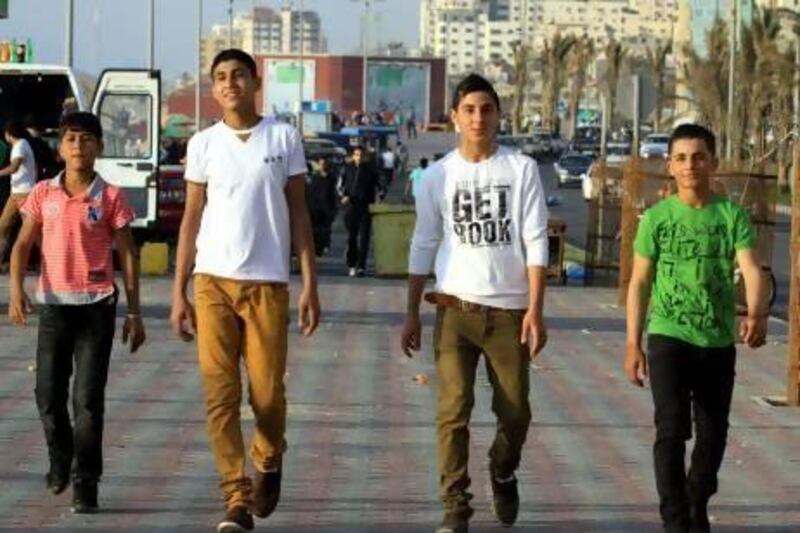GAZA CITY // Tareq Al Naqib lives in fear of what Hamas does to those whose appearance it deems inappropriate.
Last month, he said, two plainclothes officers approached him in the street, struck him in the face and then shoved him in a jeep that shuttled him to a police station. There, an officer told Tareq, 17, he looked too "western", and shaved off his spiky, gelled hair.
Human-rights workers and critics said he was one of at least 40 young men and boys whose hair had been forcibly sheared in what they called an effort by the Islamist group to root out "foreign" customs.
"Sometimes I stand on the street corner with my friends, but because of what happened, I mostly stay at home now," said Tareq, a high school student who lives with his family in an apartment in downtown Gaza City. "I know the police are watching me."
Since it took control of the Gaza Strip in 2007, Hamas has waged several campaigns to impose its strict interpretation of Islamic values. The group has banned women from smoking shisha in public and ordered female lawyers to cover their heads in court.
This year, the government mandated gender segregation in schools and forbade women from participating in a United Nations-sponsored marathon run in the territory, which was cancelled as a result of the ban.
But the head shavings differ from Hamas's usual tactics, according to human-rights groups and political observers. Such efforts often target women, they said. Further, Hamas officials generally defend their cultural campaigns.
"The government is denying this campaign, calling it acts carried out by individuals" in the Hamas-run police force, said Jamal Zakout, the director of field research at the Gaza City-based Al Mesan Centre for Human Rights.
"But the evidence we've collected overwhelmingly suggests this was a coordinated effort because these incidents have happened across the Gaza Strip."
Salama Maroof, a Hamas spokesman, said the group holds seminars in schools to "stop strange behaviour and fashions".
Calling the head-shaving incidents "individual acts", he said the government has ordered police officers to halt the practice and formed a committee of legislative and law-enforcement officials to investigate the incidents. "We only have limited complaints about a few policemen," Mr Maroofv said.
But Mr Zakout said those targeted were often too scared to complain, fearing reprisals. Of the 40 cases documented by his organisation, at least five said policemen also beat the soles of their feet, he said.
"These people were tortured," Mr Zakout said.
He and others were worried the attacks were driven by personal vendettas. Those whose heads have been sheared by police did not fit a single description, except for sporting spiky or long hair and general western dress, such as blue jeans and collared shirts, which some Hamas members also wear, said Mr Zakout.
Victims have been single and married men. Some had family members affiliated with Hamas's secular-leaning rival, Fatah, which controls the West Bank.
Some saw broader political calculations in Hamas's response to the criticism by rights groups and victims' families.
Alaa Abu Amer, director of Gaza's Palestinian Centre for International Relations and Strategic Studies, said the group probably distanced itself from the incidents for fear of damage to its image abroad. Hamas, considered a terrorist organisation by the United States and European Union, has been attempting to improve its ties with the West, hoping for support to end Israel's blockade over Gaza.
"In the past, Hamas officials rarely denied carrying out these kinds of campaigns," he said. But Khaled Meshaal, Hamas's leader in exile, "has been trying to show to the world that Hamas is moderate, and these incidents of cutting hair come at a sensitive time for the group".
He added that the group probably initially ordered the head shavings to placate hard-line officials inside Gaza.
Hussam Abu Sitta, a sociologist who teaches at Gaza's Al Azhar University, said such incidents widen the gulf between political Islamists and secularists, a struggle that has intensified across the region after Arab Spring uprisings.
"This places doubts in their minds about the role of religion in society, and in some cases they rebel against religion and the authorities that impose their religious values," he said, referering to people who have had their heads forcibly shaved.
Tareq, whose family worked in the Fatah-led government deposed by Hamas in 2007, said his experience simply turned him off to politics. He initially told rights group about his experience, but said policemen had since come looking for him at his home. He declined to be photographed.
He recalled a conversation he had while an officer shaved his head. "He told me: 'If you want to hate me, go ahead and hate me. If you want to complain, go ahead and complain. But what I'm doing is for your own good because it will make you a man'."
Looking back on the incident, Tareq said: "How does this make me a man?"
Even though he does not go out much anymore, he said he intends to grow his hair.
hnaylor@thenational.ae
Human-rights groups attack Hamas for head-shaving incidents
Hamas distances itself from at least 40 instances of young men and boys who were forced to have their heads shaved, saying the incidents 'were individual acts'

Editor's picks
More from the national




